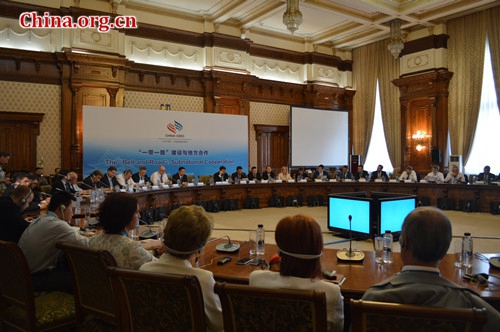B&R Initiative brings initial benefit for CEE countries
The Belt and Road Initiative has brought tangible benefits to Central and Eastern European (CEE) countries, who are looking forward to broader cooperation, according the assessment of the 2017 China-CEE Countries Political Parties Dialogue, ending in Bucharest, Romania, on July 14.
|
The 2017 China-CEE Countries Political Parties Dialogue concluded in Bucharest, Romania, on July 14. [Photo/China.org.cn] |
The meeting brought together 600 political party leaders, representatives and entrepreneurs from China and the 16 CEE countries, who discussed new philosophies, ideas and measures for implementing the Belt and Road Initiative.
Rapid development of direct China-Europe freight train services as well as e-commerce industry in China has effectively upgraded Poland's agricultural exports to China, said Michal Ludwikowski, general director of Polish Economic Congress Foundation.
Fresh, natural apples in Poland, one of the largest producers in Europe, have entered more and more households in China, a blessing both for Chinese consumers and Polish farmers, as freight trains ensure the transport speed and quality of agricultural products.
Poland aims to have more comprehensive collaboration with China in the future in terms of infrastructure and transport connectivity, which is of great importance to countries with a strong agricultural sector like Poland, Ludwikowski said. He also wanted to seek ways to develop bilateral tourism.
The Czech Republic is a leader in spearheading the Belt and Road Initiative in the region. As a time-honored Chinese friend and an active participant of the Belt and Road Initiative, it has made striking improvements in such areas as finance, regional development, healthcare and cultural cooperation, said Jan Hamacek, Speaker of the Czech Parliament and Deputy Chairman of the Czech Social Democratic Party in the Dialogue.
Three direct flights between Prague and China have been opened, Chinese investment has steadily increased, and companies of both countries are keen to cooperate; meanwhile, the country is greeting an increasing number of Chinese tourists. All these factors are increasing trade and creating jobs.
What we need now are more concrete projects to improve connectivity between Europe and China in order to benefit EU and Chinese citizens, added Hamacek.
Other countries including Serbia and Hungary also lauded the Initiative as bringing solid results for their peoples.
China-CEE trade increased to US$58.7 billion in 2016 from US$43.9 billion in 2010, according to China's Ministry of Commerce. The share of China-CEE trade in China's overall trade with Europe expanded to 9.8 percent in 2016.
The Dialogue, jointly held by the International Department of the Central Committee of the Communist Party of China and Romania's Social Democrat Party, is the second of its kind, the first being held in Budapest last year under the China-CEE cooperative mechanism dubbed as 16+1 framework. It has become a platform for political parties to discuss development strategies regardless of ideological and geographical differences.
The Belt and Road Initiative refers to the Silk Road Economic Belt and the 21st Century Maritime Silk Road as put forward by President Xi Jinping during his visits to Kazakhstan and Indonesia in 2013.
